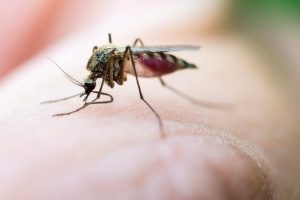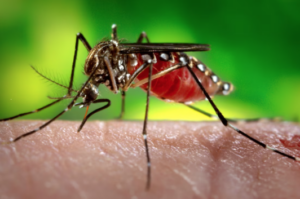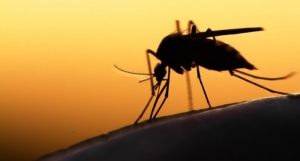People who live in areas where mosquitoes are rampant insects often have certain questions about the nature of this bloodthirsty insect. People are usually interested in learning more about mosquitoes when they are planning an outdoor trip (like fishing or camping). These questions have been addressed in this article as a means to inform you of what exactly this dastardly part of nature is.
Why do mosquitoes bite?
All mosquitoes do not bite. Only female mosquitoes bite, and this is because of the need blood for the development of their eggs. They are said to produce 1 to 3 batches of eggs in their lifetime, and when they are ready to develop and produce their eggs, they search for blood. Female mosquitoes have six different “stylets” that they use to pump the blood from our bodies (4 are used to saw a hole into tiny capillaries right under our skin, one is used to inject saliva to make the blood flow more freely, and one is used for the actual pumping mechanism). Mosquitoes have an incredible ability to find human skin, even if far away.
Are there ways to attract mosquitoes?
There are certain things which will attract mosquitoes to you, including:
- Wearing dark colored clothes,
- Body odor,
- Wearing perfume or cologne,
- CO2 (basically, breathing),
- Jogging or Exercising,
- Body heat,
- Type O blood,
- Wearing sweaty socks,
- Secreting lactic acid.
Basically, anything you do that emits more body heat, odor, or CO2 will make you a more attractive target for mosquitoes, or perhaps it simply makes you easier for them to find. There is also some evidence emerging that some humans are genetically predisposed to be more attractive mosquito targets. Your genetics might be the reason you get bitten more often than your friends. The science is still emerging.
How long do mosquitoes live?
Depending on the species, mosquitoes can have a lifespan of several weeks to several months. Female mosquitoes have a longer average lifespan than male mosquitoes. It is believed that most mosquitoes in a natural, wild environment probably live for a few weeks, but under perfect conditions they can survive for a much longer time.
Why do we itch after mosquito bites?

The itching sensation that we feel after being bitten by a mosquito is our body’s reaction to the anticoagulant that the female mosquito injects with her saliva (when she wants to make our blood a bit more free flowing). Some people get hives, rashes, and more serious symptoms from mosquito bites — we call that skeeter syndrome.
If the female mosquitoes bite, what do male mosquitoes do?
Male mosquitoes are responsible for fertilizing the females. They feed on nectar and are pollinators. Females mate with males only once and store the sperm which will fertilize the eggs that she will lay.
Are mosquitoes attracted to water?
Yes, they live in water and rely on trips to water for the elimination of carbon dioxide and inhaling fresh oxygen. Female mosquitoes even lay their larvae in stagnant pools of water, and the larvae spend the first two weeks of their lives in the water. Hence, they are also attracted to humidity, which is why they are attracted to humans when they breathe because we are essentially exhaling water vapor. This is why targeting water in your yard is one of the best ways to reduce the number of mosquitoes around.
The important thing about mosquitoes and water is that they like low-oxygenated water. Water that is moving fast, like a stream that is running over rocks, usually has too much oxygen for mosquitoes to like.
How fast can mosquitoes fly?
Depending upon the species, mosquitoes can fly at about 1 to 1.5 miles per hour. Given their small size, that is an incredible rate of speed and a big reason they are so hard to swat.
How far can mosquitoes fly?
Mosquito species that prefer to breed around the house have a limited flight range of about 300 feet. Most species have flight ranges of 1-3 miles, and they usually

don’t venture far from their home base. That means that the typical mosquito spends most of its life within a mile or two of where it hatched. Salt marsh breeders are the most mobile species as they have been known to migrate up to 100 miles on average in even the most exceptional circumstances.
How much do mosquitoes weigh?
Smaller species found around houses weigh around 2.5 milligrams. Larger species weigh around 10 milligrams. The “elephant mosquitoes” found around Australia tend to be the largest.
How much blood does a mosquito take in a meal?
When feeding to repletion, mosquitoes can imbibe anywhere from 0.001 to 0.01 milliliter. They use the protein and iron from the blood to help make their new eggs.
Can Mosquitoes Bite Through Clothing?
Yes. Mosquitoes have been known to bite through fabric — thin fabric. Unfortunately, the time of year when mosquitoes are out is usually when you do not want to be wearing lots of denim or heavy clothing. Consider slightly heavier, skin-covering fabric in the evenings when bugs are worst, and look into special shirts for mosquito bite prevention. These shirts are designed by outdoor companies just for this purpose.
Do Mosquitoes Have Natural Enemies?
Yes, mosquitoes have natural enemies. The most common and well-known mosquito predator is the bat. A brown bat can actually eat 1,000 mosquitoes per hour! That is why decreasing bat populations is a concern when it comes to mosquito control. Many birds also eat mosquitoes, and some fish and minnows eat mosquito larvae in ponds and lakes. There are also some plants that mosquitoes don’t like, but it doesn’t really kill them.
Do mosquitoes have an actual purpose?
Mosquitoes fill some niches in nature. They have been known to have existed from the Cretaceous Period (about 100 million years ago) in North America. Their adaptability has made them very successful, with over 2,700 species in existence worldwide. Mosquitoes serve as food sources for a variety of organisms but are not crucial to any predator species. Animals such as bats rely on mosquitoes for a big part of their nutrition during warmer months. It seems that the main purpose of mosquitoes, though, is to reproduce.
When are mosquitoes most active?

There are some species of mosquitoes which are more active between dawn and dusk (when the air is much calmer), but there are other species which feed at any time of the day. They prefer a warm and moist environment, and mosquitoes that transmit diseases are usually active all year around.
How do mosquitoes get into my house?
Mosquitoes can enter your house through any portable region, including an open or broken window, bathroom exhaust vents, etc. Any doorway that is not sealed is a simple place for mosquitoes to pass through. One particular region which is a favorite is the garage, which is often less-sealed and with large, open doors at many times. We did an entire piece on getting rid of indoor mosquitoes.
Do all mosquitoes transmit diseases to humans?
Not all mosquitoes transmit diseases; there are only a certain number of species which do so. Some common diseases include malaria, dengue, eastern equine encephalitis (EEE, “triple E”) and Western Nile Virus (WNV), etc. Keep in mind that there are over 3,000 species of mosquitoes in the world, and each species can typically carry some but not all of mosquito-borne diseases.
Can mosquito bites leave scars?
Yes, on occasion, a mosquito bite can leave a scar. The scar could be caused by a secondary act — the scratching of the itch — in which case the scar is actually being caused by your own fingernails! But a scarring could occur if it is a more potent bite and you have the type of skin that tends to scar easily. The scar will be tiny, but could be there.
We did a piece on how to get rid of mosquito bite scars if you want to learn more about how to get rid of a mosquito bite scar.
How can I Prevent Mosquito Bites?
Much of this website is devoted to answering that question, but we are still glad you asked it. First, you need to reduce the number of areas that mosquitoes find attractive in your surroundings, and making your yard mosquito-proof. That means getting rid of standing water and long weeds. Reducing mosquito habitat means fewer mosquito bites.
Second, if you can’t get rid of the root cause, you may need to explore either a mosquito repellent, something that will keep mosquitoes from wanting to land on your skin. The good thing about such repellents is that they will keep other bugs away too, such as black flies or ticks.
Finally, you can resort to other mechanical creations for getting rid of mosquitoes. A couple that are popular are using a mosquito racket (good if you are just having the occasional mosquito bother you on a deck, for example). or potentially some type of mosquito killer. Neither are a long-term fix, but they might reduce mosquito bites for the short-term.






